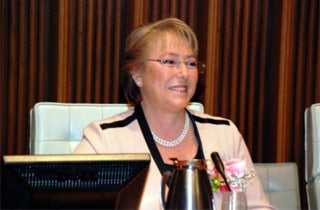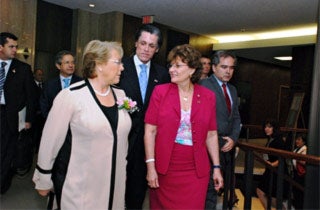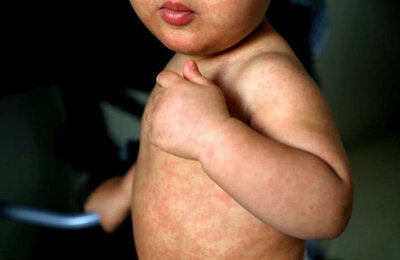Michelle Bachelet says international cooperation, not protectionism, is key to an effective response
Washington, D.C., 24 June 2009 (PAHO) — Chilean President Michelle Bachelet today called on countries in the Americas and around the world to work together to mitigate the impact of the A (H1N1) influenza pandemic on public health, saying that "protectionist" measures such as travel restrictions are counterproductive.

Photo David Spitz (PAHO/WHO)
"The truth is, the only solution is cooperation, working together and not closing doors to the movement and entry of people between countries," said Bachelet in remarks to the Executive Committee of the Pan American Health Organization (PAHO), which is holding its annual meeting in Washington this week.
Chile is one of 28 countries in the Americas that have confirmed cases of A (H1N1) influenza. Globally, more than 100 countries and territories have reported over 55,000 confirmed cases to PAHO and the World Health Organization (WHO). These include nearly 44,000 cases in the Americas. All but four of the 238 confirmed deaths worldwide have occurred in the Americas.
Chile has confirmed over 4,000 cases of A (H1N1), more than any of its neighbors. But Bachelet noted that her country has "great capacity for disease notification, we have good reporting, and that's why we know very well how this epidemic is evolving."
Bachelet, a medical doctor who served as Chile's minister of health from 2000 to 2002, criticized other countries' efforts to restrict travel to and from countries affected by A (H1N1).
"It seems to us that these kinds of responses, motivated by fear, are not the responses that we who work in health know are necessary to confront an epidemic of this nature."
Despite the growing number of cases, Chile is coping well with the epidemic, Bachelet said, thanks to a strong public health system, wide access to health care, and concentrated efforts in the past five years to prepare for a possible influenza pandemic.

Chilean President Michelle Bachelet and PAHO Director Dr. Mirta Roses. Photo David Spitz (PAHO/WHO)
Bachelet noted that Chile was working closely with PAHO, the U.S. Centers for Disease Control and Prevention (CDC), and other governments to exchange information and expertise to better understand the impact of the epidemic. She said a team from the CDC is cooperating with health officials in Chile to learn more about the impact and evolution of the disease.
Bachelet said she would travel to Mexico later in the day to offer her country's support and collaboration in dealing with A (H1N1). "I am going to meet with President Calderón to express our solidarity to the Mexican people."
Bachelet praised the role PAHO and WHO have played in facilitating international cooperation on preparedness and response to the pandemic. She cited the organizations' promotion of the International Health Regulations, which govern how countries report disease outbreaks of international concern. PAHO and WHO have been working with their member countries in recent years to improve surveillance, laboratory capacity, and case investigation to help them comply with the regulations.
Bachelet said international cooperation was also important in mitigating the effects of the international economic crisis, and that poverty reduction and progress in health should remain priorities for both national governments and international agencies. Chile is currently involved in international cooperation efforts focused on cancer (with the U.S. National Cancer Institute) and reducing hunger (with Bolivia, Ecuador, and Paraguay), among others.
Chile has among the best health indicators—including high life expectancy and low rates of infant and maternal mortality—in Latin America and the Caribbean, although chronic diseases are a growing problem. The country's health policies seek to ensure universal access to health care and limited out-of-pocket spending by individuals.
Bachelet said her country shows that "it is possible to combine economic growth and social justice" and that universal health coverage is an "achievable dream" for developed and developing countries alike. "The difference is spending on public health. Spending should be on people, not by people."



